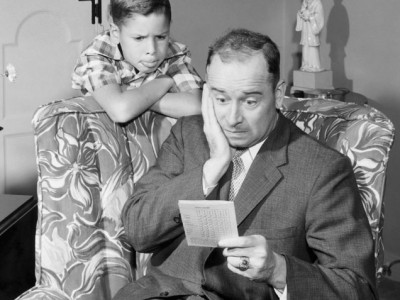The first report card of the year can create feelings of pride, happiness and excitement for many parents. It can also produce feelings of anxiety and frustration for those who are surprised by their child’s grades. However, effective and continuous communication among teachers, parents and students can help minimize the “report card surprise.”
If a parent is surprised by a “poor” report card, it often means that they haven’t been effectively communicating with their child or their child’s teacher throughout the school year.
Students who are surprised by their own report cards also need to improve their communica on and organiza on pa erns. A student who surprisingly receives a “D” or a failing grade on his report card learns the hard way that he needs to regularly talk with his teachers and stay on top of school work, homework and test results.
Sylvan Learning, the leading provider of tutoring to students of all ages, grades and skill levels, o ers the following advice to help parents maintain clear communica- ons with their children and teachers:
Tips for Talking To Children
• Talk about school every day. Make it a regular part of the family’s routine.
• Don’t wait until report cards are issued to talk about school and grades. Frequently discuss with her how she is doing in each subject and what grade she anticipates receiving.
• Encourage your child to tell you about his day. Find out what he learned and what are his favorite ac vi es.
• Teach your child that education is import- ant to your family.
• Discuss goals and objectives for the school year. This may be a great way to learn about difficulties your child is having in specific subject areas.
• If your child is having trouble in school, talk about a method to help organize her schedule, subjects and activities. A calendar can be a great way to track tests, homework, activities and study plans.
• Talk with your child about his extracurricular activities, such as team sports or after-school jobs. Being over scheduled may affect his grades.
• Set improvement goals for your child. This will help her work towards an a ain- able grade for each class.
• Talk with your child about his study habits and develop a study plan. Set aside speci c me for studying, projects and activities each evening and make sure that he has a properly equipped and well-lit area to work.
• Communicate with your child about her school experiences. Know what she is thinking and feeling. Also, openly talk with her about her worries and concerns as well as her joys and achievements.
Tips for Talking to Teachers
• Develop a parent/teacher rela- onship with your child’s teacher and talk with this teacher at least once a month throughout the year. Remember that your child’s teacher has direct contact with your child every school day and can offer invaluable insight into your child’s day.
• Your child’s teacher can benefit from background information about him – talk about activities he likes, special needs, close friends, motivation and things going on at home.
• Find out what the teacher’s expectations are for the year and what type of curriculum he or she has set for the students.
• Talk to the teacher about any major programs or activities that are set for the year. Is there an annual science fair? A eld trip schedule? Major papers? Tests?
• Remember – teachers are busy people, too. Find out the easiest way to communicate – by email, phone or in-person. Finding the right communication method will make it easier to speak on a regular basis.
For more educational resources for children in grades pre-K through 12, please visit SylvanLearning.com, Dinopapa@ sylvan3007.com or call (912.355.2267).
Dino Papadopoulos is the Executive Director at Sylvan Learning of Savannah.
